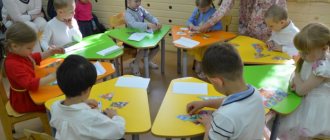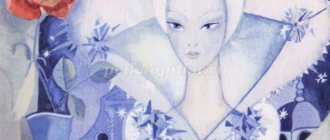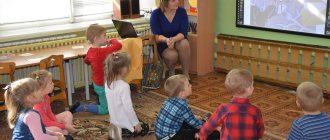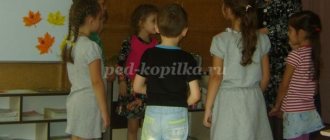Summary of educational activities for speech development “Journey to School”
Goal: developing the communicative competence of preschoolers.
Tasks:
1. Correctional - educational: - Expansion, clarification, updating of the dictionary on the topic “School supplies”. - Improving the grammatical structure of speech (inflection skills, word formation) 2. Correctional - developing: - Development of general and fine motor skills, coherent speech, thinking, imagination; - Development of spatial orientation: 3. Correctional - educational: - Nurture in children the skills of cooperation, a sense of responsibility, accuracy, initiative, independence. Equipment: school supplies, bell, laptop (with a recording of the song “What do they teach at school?”), ball, mnemonic diagrams (sound, letter), red circles, “diaries” on the board and for children (sheet with names of lessons) , counting sticks.
Progress of the lesson.
1. Organizational moment.
- Let's smile at each other and everyone will say hello to their neighbor, calling him by his affectionate name. - Having guessed the riddles, you will find out what we will talk about today.
- I look like a box, you put your hands in me. Schoolboy, do you recognize me? Well, of course, I -... (pencil case)
If you perfect it, you can draw whatever you want: the Sun, rivers, mountains, beach. What is this? (pencil)
Now I'm in a cage, now I'm in a line. Be able to write about them! you can also draw What am I... (Notebook)
If you give her a job, the pencil was in vain. (Rubber)
I’m ready to make the whole world - a house, a car, two cats. Today I am the ruler - I have... (Plasticine)
I'm big, I'm a student! In my backpack... (Diary)
There is a house: Whoever enters it will acquire intelligence. (School)
- Well done, guys, everyone guessed the riddles! Who guessed what awaits us today? — Would you like to be at school now? Now I will say the magic words and you will all turn into schoolchildren. Shall we try? Close your eyes. - Spin around, spin around, you’ll all turn into schoolchildren. That's it - now you are real students - first graders. And this is our class. It has desks, a blackboard and even a grade book. — What are the names of the children who study at school? (students) - Who teaches the children? (teacher). -I will be the teacher, and you will be my students. — We will have 5 lessons and for each lesson we will receive grades. Agreed?
The bell rings. Lesson 1 - literacy.
I will make different sounds, if you hear the sound A , clap your hands. (A, O, U, O, Y, A, O, U, I, Y, A, O) -And now let’s play the game “Traffic Controllers.” I will pronounce words, if you hear that a word begins with the sound A , raise the red circle. (Orange, house, onion, pineapple, Anya, varnish, bus) - The Evil Sound Eater ate the first sounds of A in words. You need to know these words. - Think of words that begin with the sound A. (children call in a chain). - Look at the diagram. We hear sounds with our ears and pronounce them with our mouths. (Ear-mouth diagram) - The sound A is denoted by the letter A. (A letter is set). (Eye-letter diagram) I suggest you write the letter A in the air, and now we will lay out the letter A from sticks. - The lesson is over. Well done! Let's put 5 in our diaries! (Children stick 5 in their “diary”, and the speech therapist is on the board)
Call. Physical education lesson.
F/minute:
One, two, three, one, two, three - (movement in a circle with a sporty step) We came to visit the school. We stand on our toes - (walking on our toes) And grow, grow, grow - arms (slowly raising our arms up) We stand up and squat - (children squat and stand up one by one) And we won’t get tired at all. We’ll grow up a little - (torso tilts left - right) We’ll be happy to go to school - (I keep walking in a circle).
- Well done. We give ourselves a 5 in physical education, the next lesson is mathematics.
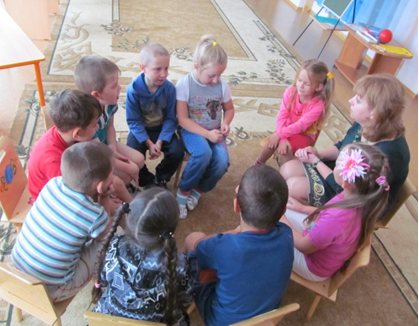
In this lesson, you and I will count the school supplies that we cannot do without at school. (counting to 5 with the words pencil, pen) -And now I propose to play the game “One - Many.” Children, in a chain, take objects (school supplies) and say: “I have an eraser, but there are erasers in the store,” pencil - , pen - , album - ,
Well done! Now let's compare the objects: Game "On the contrary"
The pencil is short, and the ruler is .... (long) The notebook is thin, and the book is .... (thick) The eraser is small, and the pencil case ..... (large) The album is light, but the briefcase ... (heavy) The green pencil is sharp, and the blue ... (blunt)
-Now let's count the syllables in words (ruler, pencil, pen, chalk, plasticine). Which word is the longest, shortest? - The lesson is over. Well done! Let's put 5 in our diaries! (Children stick 5 in their “diary”, and the speech therapist is on the board)
Call. Turn.
the game “Big-small” with the ball .
I name a word - an object and throw a ball to one of you. The one who catches the ball calls it affectionately. Paints, pencil-, notebook-, book-, ruler-, pencil case-, brush-, eraser-, plasticine, paperclip-, button-.
The bell rings for class. The next lesson is natural history.
What do you think is being taught in this lesson? (children’s answers) The lesson will not be ordinary, we will solve tricky “Trick Riddles”
In winter, in a den, he dreams of a Shaggy, Clubfoot...elephant (bear)
The fastest one rushes out of fear... is the tortoise (hare)
Even a foreigner knows that everyone in the forest is more cunning than the hare (fox)
A simple question for kids: “Who is the cat afraid of?” ...mice (dogs)
The whole street heard the chicken (cow) mooing.
Game “Does this happen?”
Correct the mistakes.
Pupils go to school at night. You can take pajamas to school. The pencil case was put in Dasha’s briefcase. The primer is read by the student. Vova was cutting paper with scissors. - The lesson is over. Well done! Let's put 5 in our diaries! (Children stick 5 in their “diary”, and the speech therapist is on the board)
Music.
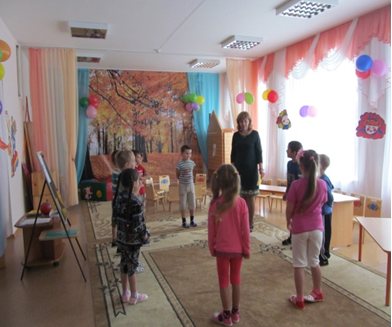
Children take comfortable positions (on the carpet). I suggest you listen carefully to the song called “What do they teach at school?” — What did you learn from the song about what they teach at school? (Children answer) - The lesson is over. Well done! Let's put 5 in our diaries! (The children stick 5 in their “diary”, and the speech therapist is on the board) - And now it’s time for us to go back to kindergarten. Let’s say our magic words: “Spin around, spin around, turn into a preschooler!” Here we are in the garden!
Lesson summary:
— Today we visited school. I want you to answer the question of whether you want to go to school and why. (The bell “goes” in a circle) Children pass the bell around in a circle and express their opinion:
-I want to go to school because... or - I don’t want to go to school because.....
-Very soon you will all go to school, where the first teacher will meet you. For you, she will be the smartest, most beautiful, kind and strict, caring, like a mother. I am sure that you will study only with an “A”!!
— To remember our trip, we will take a photo with our “diaries.” You will see the photo on the stand in your group. I will also give you colored pencils that you can use in your group to draw in your free time.
Author: Olga Petrovna Zykova, speech therapist teacher, MBDOU d/s “Rybka”, Tomsk region, Asino, Russia
The article is published in the author's edition
Abstract of GCD for speech development in kindergarten. Senior group
ECD for children of the senior group on speech development “Guests have come to us”
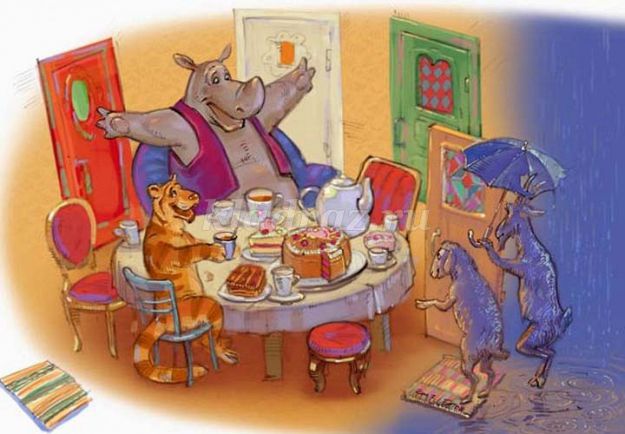
Goal: Stimulating children's speech activity. Program objectives: • Enrich children's vocabulary with the help of verbal and speech games. • Develop the ability to observe communication ethics in conditions of collective interaction, to notice and kindly correct mistakes in the speech of peers. • Be able to construct your statement, focusing on the task of communication, using elements of evidence, generalizations based on characteristics, anonymous names. • Foster a desire for new achievements. /The teacher and the children greet guests at the entrance/. Teacher: Guys, I told you that guests will come to us soon. Here they come. We are very glad to see you. We talked a lot about the meeting and decided to start communicating with a game of greetings. Are you ready to play with us? The game has a rule, and the guys and I know that if there are rules, then they are (You need to follow, observe, act). And the rule is this: listen carefully to the text and perform actions in accordance with it. Let's say hello with your hands. Let's say hello with your legs. Let's say hello with your eyes. Let's say hello with our mouths. There was joy all around! Teacher: Guys, the guests came to us for a reason, they brought just such a box. What do you think might be in it? (Children's assumptions). How can you find out? (Open). Guys, our guests also have a rule. Open the box only when you complete the tasks and then a surprise awaits you. What is a surprise? (Surprise, joy). What decision do we make? (Children decide to start completing tasks). /The teacher offers to sit on chairs. Draws attention to the children’s posture, to the fact that they need to be very attentive, not interrupt each other when answering, and help/. TASK No. 1 “Listen to the story and answer the questions.” N. Sazonova “Warm feeder”. It was winter. Vanya was coming from kindergarten. He carried a gingerbread in his hand. The boy did not notice how he dropped the mitten and gingerbread. Vanya came home - no mittens, no gingerbread. Where are they? And at this time the sparrows flew onto the gingerbread, pecking at it and chirping. They had already eaten all the gingerbread and began to peck at the mitten. Vanya looks out the window at his mitten and thinks: “What a warm bird feeder it turned out to be.” • What is the name of the story? • Where did Vanya come from? • What was he carrying? • What didn’t Vanya notice? • Who pecked the gingerbread? • What did Vanya think? We have completed the first task, let's move on to the next one. TASK No. 2 “Say a word with the opposite meaning.” Teacher: To complete this task, let’s stand in a circle. I will tell each of you a word, and you say the opposite in meaning. (Good - evil, good - bad, friend - enemy, day - night, peace - war, truth - lies, rich - poor, heavy - light, thick - thin, high - low, wet - dry, big - small, laughs - cries, speak - remain silent, brave - cowardly, white - black). Teacher: Very good and we are completing the next task. TASK No. 3 “Formation of phrases.” Guys, let's go and sit on the chairs. Guys, why are we doing tasks? What is a surprise? I want to remind you that there is no need to shout from your seat, but we speak only after we raise our hand. The next task is this: you need to create a new expression from the given words. For example: “A house made of snow is a snow house.” • Wool mitten. • Wooden spoon. • Path from the forest. • Leather gloves. • Brick house. • Slide made of ice. • The machine is made of plastic. Teacher: Well done. There is one last task left. TASK No. 4 “Name the common characteristic of objects?” Guys, there are cards on the floor with circles of different colors on them - these are “houses”. If they are different colors, what do they mean? (Multicolored). You have circles of the same colors in your hands, each of you go to your house. And now the task. You need to take a card, look at it carefully and say what is drawn on the card and what these objects have in common. /The cards show: • Boots, pacifier, ball (rubber). • Slide, snowman, snowflake (snow). • Burrow, house, hollow (dwelling). • Apple, button, tomato (shape). Teacher: Well, we completed the tasks. Tell me, was it difficult to complete the tasks? What was the most interesting task? What awaits us now? (Surprise) What is this? (Joy, surprise). Let's all go open the box. /Children find sweet prizes/.
We recommend watching:
Summary of a subgroup GCD on speech development in the senior group. Summary of a lesson on speech development in the senior group. My Sevastopol Summary of a lesson on speech development in the senior group with a presentation. Bazhov “Silver Hoof” Summary of educational activities on speech development in the senior group. Retelling of Tolstoy's story "Clever Jackdaw"
Similar articles:
Summary of a lesson on speech development in the senior group. Retelling of a work of art. Tolstoy "Two Comrades"
